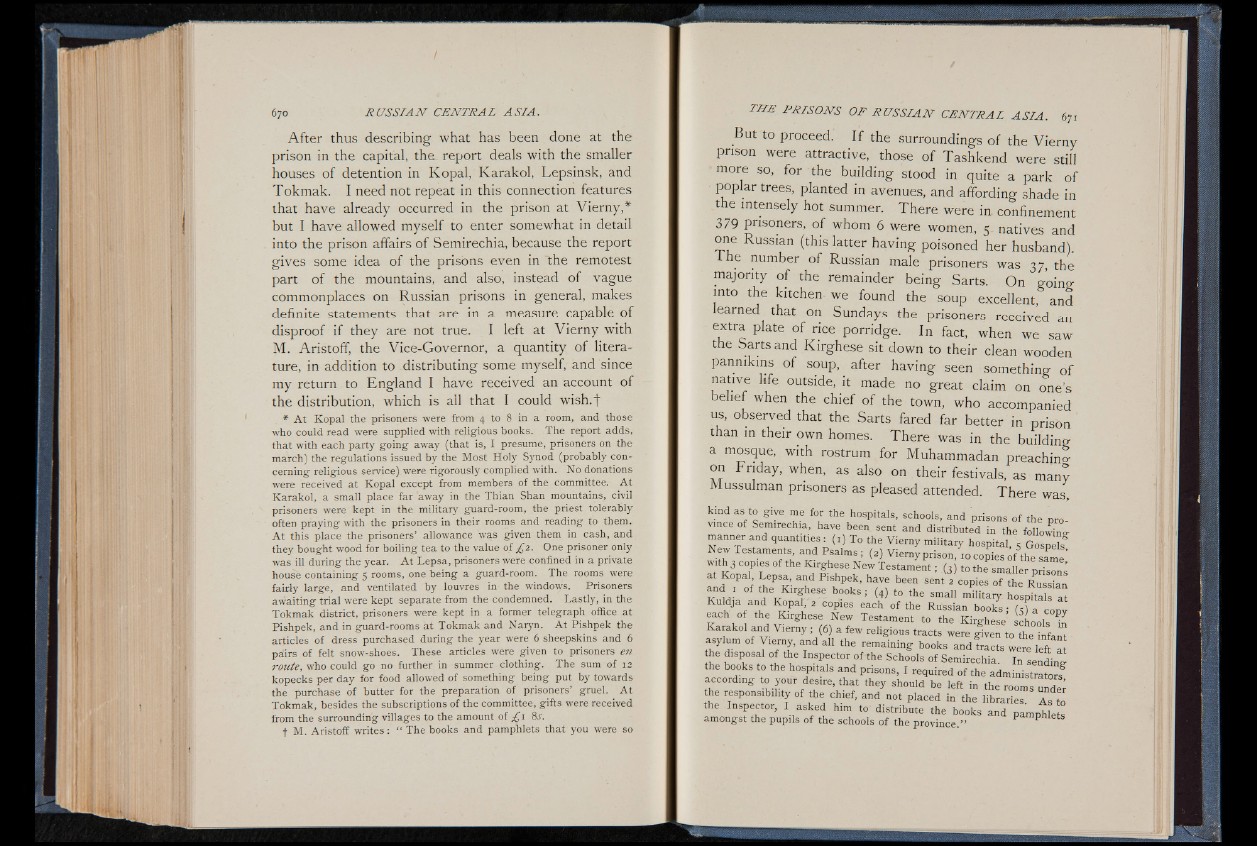
After thus describing what has been done at the
prison in the capital, the- report deals with the smaller
houses of detention in Kopal, Karakol, Lepsinsk, and
Tokmak. I need not repeat in this connection features
that have already occurred in the prison at Vierny,*
but I have allowed myself to enter somewhat in detail
into the prison affairs of Semirechia, because the report
gives some idea of the prisons even in "the remotest
part of the mountains, and also, instead of vague
commonplaces on Russian prisons in general, makes
definite statements that are in a measure capable of
disproof if they are not true. I left at Vierny with
M. Aristoff, the Vice-Governor, a quantity of literature,
in addition to distributing some myself, and since
my return to England I have received an account of
the distribution, which is all that I could wish.f
* A t Kopal the prisoners were from 4 to 8 in a room, and those
who could read were supplied with religious books. The report adds,
that with each party going away (that is, I presume, prisoners on the
march) the regulations issued by the Most Holy Synod (probably concerning
religious service) were rigorously complied with. No donations
were received at Kopal except from members of the committee. A t
Karakol, a small place far away in the Thian Shan mountains, civil
prisoners were kept in the military guard-room, the priest tolerably
often praying with the prisoners in their rooms and reading to them.
A t this place the prisoners’ allowance was given them in cash, and
they bought wood for boiling tea to the value of £2. One prisoner only
was ill during the year. A t Lepsa, prisoners were confined in a private
house containing 5 rooms, one being a guard-room. The rooms were
fairly large, and ventilated by louvres in the windows. Prisoners
awaiting trial were kept separate from the condemned. Lastly, in the
Tokmak district, prisoners were kept in a former telegraph office at
Pishpek, and in guard-rooms at Tokmak and Naiyn. A t Pishpek the
articles of dress purchased during the year were 6 sheepskins and 6
paiirs of felt snow-shoes. These articles were given to prisoners en
route, who could go no further in summer clothing. The sum of 12
kopecks per day for food allowed of something being put by towards
the purchase of butter for the preparation of prisoners’ gruel. A t
Tokmak, besides the subscriptions of the committee, gifts were received
from the surrounding villages to the amount of £1 8s.
t M. Aristoff w rites : “ The books and pamphlets that you were so
But to proceed. I f the surroundings of the Vierny
prison were attractive, those of Tashkend were still
more so, for the building stood in quite a park o f
poplar trees, planted in avenues, and affording shade in
the intensely hot summer. There were in confinement
379 prisoners, of whom 6 were women, 5. natives and
one Russian (this latter having poisoned her husband).
Ihe number of Russian male prisoners was 37, the
majority of the remainder being Sarts. On going-
into the kitchen we found the soup excellent, and
learned that on Sundays the prisoners received an
extra plate of rice porridge. In fact, when we saw
the Sarts and Kirghese sit down to their clean wooden
pannikins of soup, after having seen something o f
native life outside, it made no great claim on one’s
belief when the chief of the town, who accompanied
us, observed that the Sarts fared far better in prison
than in their own homes. There was in the building-
a mosque, with rostrum for Muhammadan preachino-
on Friday, when, as also on their festivals, as many
Mussulman prisoners as pleased attended. There was,
kind as to give me for the hospitals, schools, and prisons of the province
of Semirechia have been sent and distributed in the fo llo w " !
manner and quantities : (r) To the Vierny military hospital, 5 Gospels
New Testaments and Psa lms; (2) Vierny prison, 10 copies of the s ! e
with 3 copies of the Kirghese New Testament; (3) to the smaller nrim ’
at Kopal I-epsa, - PUhp.k, j g ,
MM °f H A H I b00ks I (4) to the small military, hospitals “
Kuldja and Kopal 2 copies each of the Russian bo o ks; (5 ) a copy
each of the Kirghese New Testament to the Kirehese srhnnic ^
Karakol religioo,
asylum „ ( V , s „ y , , „ d ,he
he disposal of the Inspector of the Schools of Semirechia. In s e n d !
the books to the hospitals and prisons, I required of the administratorf
according to your desire that they should be left in the rooms und«
he responsibility of fie chief, and not placed in the libraries. I s t0
the Inspector, I asked him to distribute the books and pamphlets
amongst the pupils of the schools of the province.” PamPmets